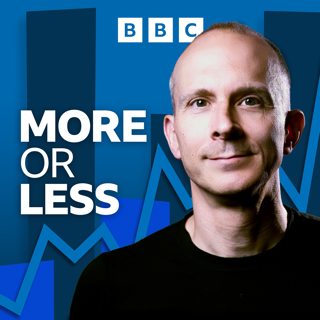
WS MoreOrLess: Anti-Semitism
Is anti-semitism on the rise? Ruth Alexander and James Fletcher look at the numbers, as media reports in the wake of the Gaza conflict suggest anti-semitism is a growing problem. Does the evidence support the claims? This programme was first broadcast on the BBC World Service.
18 Elo 20149min

Student Loans
The cost of the government's new student loan system is rising according to a recent report. Tim Harford investigates whether the rising costs should have been foreseen, and whether the new system will end up costing more than the old one. Plus: mobile phone goldmines in our pockets; paedophilia in the priesthood and from machine learning to deep learning.
15 Elo 201428min

WS MoreOrLess: Ebola
What do we know about how deadly the Ebola virus is, and how likely is it that there might be an outbreak of the virus in the United States or Europe?
10 Elo 20149min

WS MoreOrLess: Fear of Flying
After three tragic airline incidents in eight days, is flying becoming more dangerous? Wesley Stephenson looks at the statistics behind air travel to find out? And which is the most successful nation in Commonwealth Games history? Australia, Canada, England – not even close. This programme was first broadcast on the BBC World Service.
2 Elo 20149min

WS MoreOrLess: The prevalence of paedophilia?
The Pope was reported to have said that 2% of Catholic clergy were paedophiles. Is this a big number? Wesley Stephenson looks at the research on the prevalence of paedophilia and how the Catholic clergy compare to the world's population as a whole. This programme was first broadcast on the BBC World Service.
26 Heinä 20149min

WS MoreOrLess: The Tour de France
The Tour de France has reached the mountains, but what does it take to be a good climber and why are the cyclists thin and bony, while sprinters are bigger with bulging muscles? And what is the best body type to win the yellow jersey? Also are 24,000 people really killed by lightning each year? This programme was first broadcast on the BBC World Service.
19 Heinä 20149min

WS MoreOrLess: Golden Ticket
In Roald Dahl’s novel "Charlie and the Chocolate Factory", Charlie Bucket wins a golden ticket to visit Willy Wonka’s factory. But one of our younger More or Less listeners in England wanted to find out what the chances would be of winning one of those Golden Tickets. So we sent maths book author Rob Eastaway to her school in Derby to explain the answer to her class-mates - a must-listen for anyone who struggles to get their head around probability. Also on the programme we look at whether the age of players makes a difference in World Cup football. This programme was first broadcast on the BBC World Service.
12 Heinä 20149min

Will we die before our parents?
Obesity may mean children have a shorter lifespan than their parents, it has been claimed, but is this true? Ruth Alexander looks at the data and explores the 'Obesity Paradox' – the idea that overweight people are less likely to die than those of normal weight. She also questions whether the promise of bonuses in The World Cup has improved performances. This programme was first broadcast on the BBC World Service.
5 Heinä 20149min





















